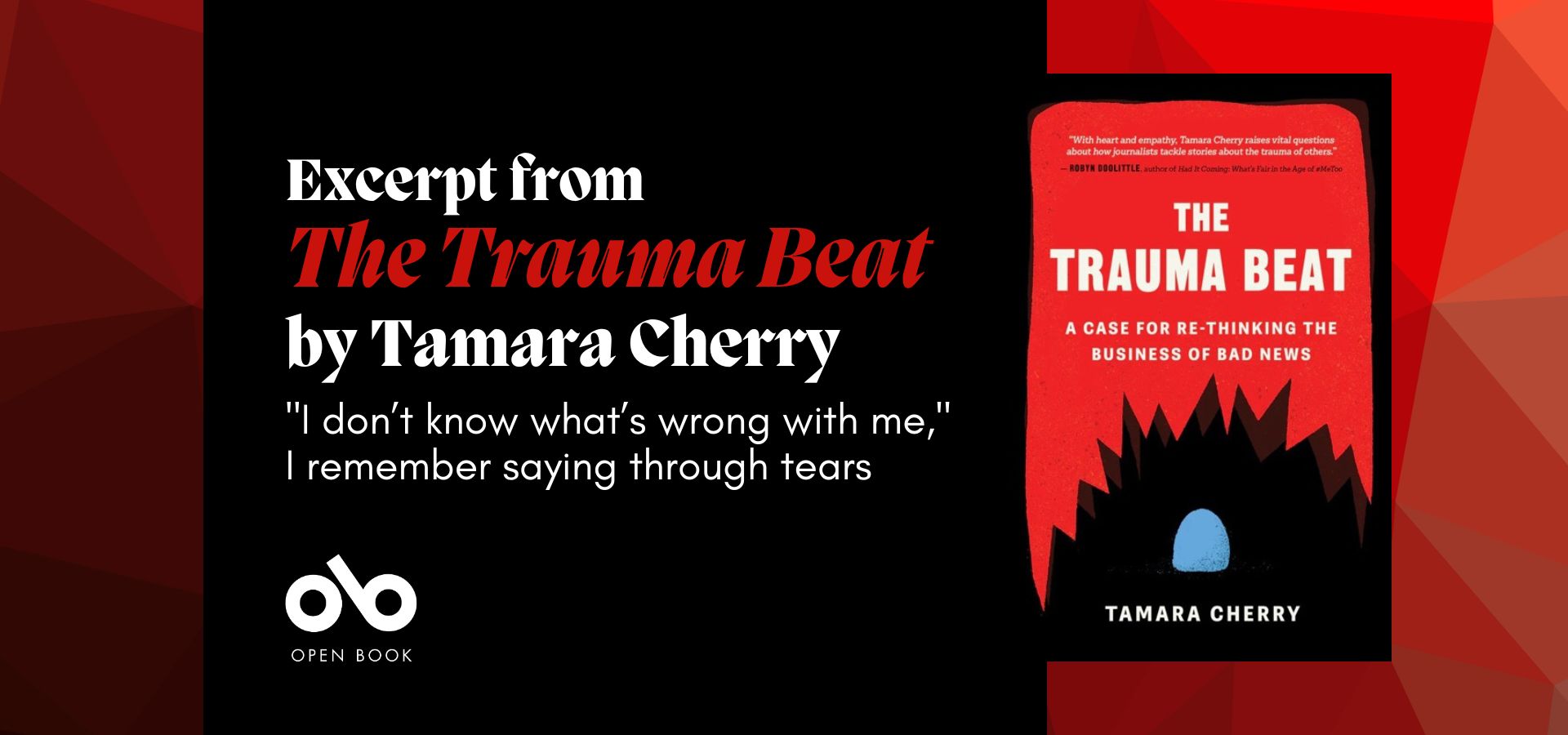Read an Excerpt from The Trauma Beat, Tamara Cherry's Call for Journalists to Change How They Cover Violent Crime
Imagine you've just experienced the worst moment of your life – the worst moment most people could imagine: the violent, unexpected loss of a loved one. In the shock-numbed minutes and hours that follow, you hear a knock on the door. Or your phone buzzes. Or perhaps someone you don't recognize even shows up in a hospital room, claiming to be a family friend. It's reporters, asking for a quote, an interview, a statement.
This ethical grey area of trauma reporting—approaching survivors in vulnerable moments for story coverage—has long been considered a necessary evil for the journalism community, or even a professional competition. But conversations are evolving about the psychological and moral impact of such practices, both for the private citizens being pressed in their darkest moments for sound bites, and for the reporters who find themselves, sometimes on a daily basis, digesting the graphic details of others' most painful experiences.
Veteran journalist and victim advocate Tamara Cherry knows exactly the toll that kind of reporting can take on a person: she developed PTSD after years of covering murders, domestic terrorism, sexual violence, and other tragedies, and she saw countless victims go through worse.
The Trauma Beat: A Case for Re-Thinking the Business of Bad News (ECW Press) is Cherry's take down of the current state of affairs, and a cri de coeur calling for empathy, intelligence, and updated practices in how trauma reporting is executed. Combining memoir and the razor-sharp nonfiction skills of an award-winning journalist, Cherry is unflinching in examining how much she got wrong in her early days, and in holding both herself and the journalism community to account to do better.
We're sharing an excerpt from this essential new book here, courtesy of ECW Press, in which we get a glimpse of the impact Cherry's job came to have on her mental health and her family.
Excerpt from The Trauma Beat: A Case for Re-Thinking the Business of Bad News by Tamara Cherry:
It’s been five days since my research paper was published, and I’ve got three interviews with people interested in hearing about my project. The first is a pre-interview with the producer of a Saskatchewan morning show. The second is an interview with a journalism prof in Toronto who is going to record and post our conversation for her class, because I’m not available during the actual class time. And the third is an interview with a journalism student from another Toronto school whose prof is a former colleague of mine. They’re back-to-back-to-back.
I’ve done so many interviews about my work since launching my company a little more than a year and a half ago that I rarely do any prep. When it comes to my research, I like to have some stats in front of me so I don’t stumble over the numbers. Otherwise, I take the advice that I’ve given so many people looking for media tips: You’re the expert in your own experience. Just talk about what you know.
Over the years, I’ve had countless journalism students, interns, and young reporters ask me how I coped with the trauma. It became a predictable question. I mean, you’re interviewing someone who only reports bad news, of course you want to know how they handle it all. I had my go-to lines: Don’t bury it. Let yourself feel it. Talk it out. Cry it out. Crying it out on long drives home was, I thought, my coping mechanism. Sometimes I would need a good, long hug after walking in the door. Sometimes those hugs had tears, tears I would soak into my husband’s shirt and wipe away before turning around to face my kids. And of course, there was the dark humour with my colleagues in the field. But I realize now that in drawing a line between my professional and personal lives, I rarely ever really talked about it. Why would I want my family to experience the horrors I witnessed that day? They’d see it on the news, why tell them more? There were times that I would start talking about horrible things, say something to my sister like, “I’m on a really bad one today,” and she’d say, “Kids?” and I’d say, “Yeah,” and she’d say, “I don’t want to hear it.” And so, I didn’t tell. And I wouldn’t tell the next one. And why would I tell my husband? Why would I want him to picture the things that I pictured at night? Why would I want him to think the awful things that I thought might happen to our children? And so, it became a rinse and repeat.
Of course, I realize now that the times my feelings over-flowed, and I felt the need to talk about it, I was directing that need toward the wrong people. I should have been seeing a therapist regularly through all those years. Instead, everything I’d bottled up would explode during unexpected moments— bursts of anger, sudden feelings of being overwhelmed, less and less patience and ability to handle unexpected situations. It was more than a decade into my career, while on maternity leave with my second child, before I finally sought professional help. My daughter was four or five months old and my anxiety was through the roof. Not anxiety about the baby. Just anxiety, period. My moods were unpredictable. Watching sad stories on the news would make me weep uncontrollably. And memories of some of the stories I’d covered over the years were surprising me in unexpected moments.
When I plugged my work history and symptoms into the computer and asked Dr. Google what might be wrong with me, two words popped up: vicarious trauma, aka secondary trauma, aka compassion fatigue. Whatever term you choose, it refers to the post-traumatic stress reactions of those who are indirectly exposed to trauma.“Vicarious trauma reactions may include intrusive imagery and thoughts, avoidance and emotional numbing, hyper-arousal symptoms, somatization, and physical and alcohol use problems similar to those experienced by direct trauma survivors,” authors of a 2004 study on vicarious trauma wrote. “Journalists’ exposure to traumatic material may be complicated further by conducting interviews with victims, witnessing the aftermath of horrific events, and the limited time they may have to process emotional reactions between the interviews and writing their news stories.”
Your CanLit News
Subscribe to Open Book’s newsletter to get local book events, literary content, writing tips, and more in your inbox
I began looking for someone who could help and found a therapist not far from my house whose specialty was working with traumatized police officers. After sending an email to his assistant with a bit of my background, I was dismayed to hear back that the clinic only sees “first responders.” So, I lowered my standards and found someone who didn’t advertise a specialty, but who did work evenings, which meant I could attend appointments without any children.
The first time I sat on her couch and she asked me why I was there, I responded with “I think I’m suffering from vicarious trauma,” and she wrote something into her notepad and raised her eyebrows and I don’t remember if she actually said it or just looked it, but what I saw or what I heard from her in that moment was “Well, that’s new.” And that’s where she lost me. I told her about my job, how I’d been covering trauma nonstop for several years, but she didn’t seem interested in that stuff. She wanted to hear about my relationship with my mother. She wanted to know again how old my baby was. “Your baby is still young,” she said on my third and last appointment. “You’ve still got a lot of hormones surging.”
And that was that for therapy for four more years.
There were many little (but severe) breaking points along the way, but the final one came that December day with the pancake batter, stirring and stirring and my rage growing and growing as I waited for my husband to return home from buying my birthday present. As the tears fell down my cheeks, I felt, as I had so many times before, totally out of control. I don’t remember a lot about the hours that followed, but I remember lashing out at my husband after the kids went to bed, and then him going downstairs and me going upstairs because I just could not bear to continue the conversation, so worked up was I, and then lying in bed and crying and staring at the wall and for the first (and thankfully only) time ever, imagining what life would be like for my kids and my husband if I were no longer there, and thinking life would be better for them that way.
I remember going down to my husband and crying, and he was either already on the phone with my sister or texting with her. He wasn’t telling me what he was saying and he didn’t have to. There was a lot of back and forth. And the next day, against all pandemic rules, she picked me up under the guise of delivering some Christmas donations and taking me for a birthday lunch, and I was exhausted and not wanting to do anything or see anyone or be anywhere, and so we went to McDonalds drive-thru and pulled into a parking spot and as I began to unpack the brown paper bag, I started to cry. “I don’t know what’s wrong with me,” I remember saying through tears. “I’m just so sad. And I can’t shake it.” Before we drove away, she sent an email to her former therapist to see if she could see me. That therapist, it turned out, had since retired. But she recommended someone else right away. And I reached out to her that day.
Nine months later, five days after my research paper was published, I am on my third interview of the morning, the one with the journalism student. The student starts the interview by saying that she can’t believe she is talking to me, that she had been a fan of mine while I was reporting. Oh, how she can’t believe it. She is so very sweet and kind, and I am so very flattered. Then, some 30 minutes or so later, she asks me what nobody in all the media interviews regarding my research and all the j-school interviews while I was on the job ever nudged me to answer. “Did you ever experience PTSD?” she says. I can hear that she is nervous as she immediately begins repeating herself in different ways. “Like, did you ever experience any PTSD symptoms? You mentioned your suffering.” She’s looking for a way to ask the question that will make it feel reasonable for me to answer.
I pause and consider my answer. I’ve always been open about therapy and how I wish I’d begun it sooner, but I’ve struggled to accept a label that I have, many times over many months of therapy, felt was undeserving. “Yes,” I tell the young reporter. “My therapist says that’s what I’ve got, that my symptoms are a classic case of PTSD.”
_______________________________________________
Excerpt taken from The Trauma Beat: A Case for Re-Thinking the Business of Bad News by Tamara Cherry. Published by ECW Press. Copyright Tamara Cherry, 2023. Reprinted with permission.
Tamara Cherry is a Regina-based award-winning journalist, trauma researcher, and media commentator who spent nearly 15 years reporting on crime in Canada’s biggest newsrooms. She is also the founder of Pickup Communications, a public relations firm that is changing the way trauma survivors interact with and are impacted by the media.





